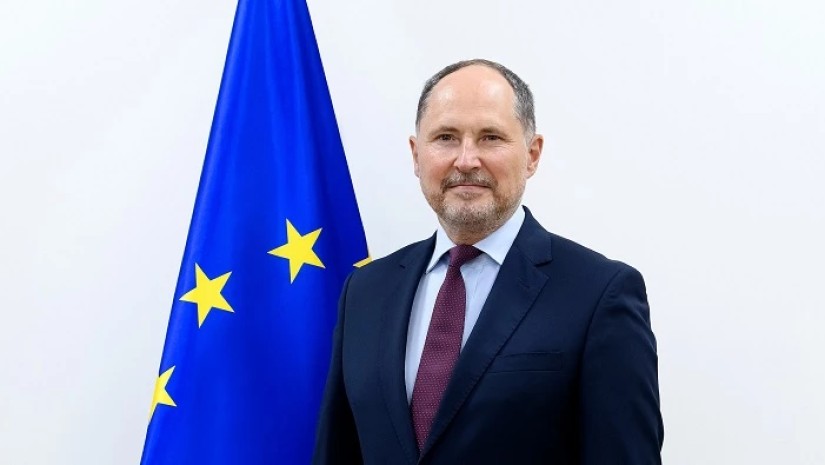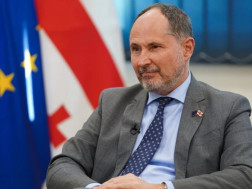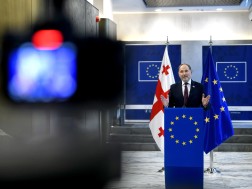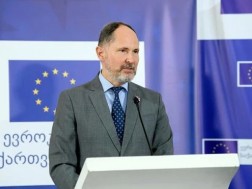The EU Delegation in Georgia invited public to submit questions regarding the EU’s work in Georgia and how the EU supports Georgia’s journey towards EU membership through social media.
The EU Ambassador Pawel Herzcynski addressed some of the questions below:
Question: What does the EU candidate status mean for Georgia and for its citizens, and what can you do to contribute to Georgia’s path towards EU membership?
Answer: Many of you replied to our call for questions, which we opened when Georgia obtained EU candidate status in December 2023. I want to thank you sincerely for your interest and assure you that we are addressing all your questions.
Let me start with what the EU candidate status means for Georgia. First and foremost, it is a recognition of the strong support that the people of Georgia have demonstrated for its European future.
Georgia’s future in the EU is linked to fulfilling several important steps, the famous 9 steps. Addressing them is crucial for Georgia to move to the next stage, which is opening the accession negotiations. All these steps and stages are not to “please Brussels” but to improve the lives of the people of Georgia and bring Georgia closer to the EU standards.
As Georgia has embarked on the path of EU membership, it is up to political leaders to work constructively together and to involve civil society and business to address the people of Georgia’s European aspiration. You can be sure that the EU will support Georgia every step of the way.
Question: Will the EU candidate Status help reduce the existing political polarisation in Georgia?
Answer: The EU is well aware that political polarisation is a serious concern to the people of Georgia. Many of you have asked about the current political climate in Georgia.
Addressing political polarisation is, in fact, the third of the 9 steps that Georgia needs to address before accession negotiations can be opened. Polarisation is a result of lack of dialogue. The EU has been consistently calling for all political leaders – the ruling party and the opposition – to engage constructively to end polarisation. There is a political consensus in favour of Georgia’s EU path, so it is a matter of agreeing on how to achieve that national goal. And our experience with those countries that have already joined the EU is that it can go quicker when there is a national consensus on the reforms necessary to join the EU.
Looking at the 9 steps, each of them, if fulfilled, leads to depolarisation: from improving the electoral process and parliamentary oversight, to fighting disinformation and ensuring fundamental rights such as freedom of assembly and expression.
All these steps need to be implemented for Georgia to move ahead in the enlargement process. We trust that the whole society take this task seriously.
Question: How does the EU candidate status assist Georgia in fighting Russian propaganda and disinformation online?
Answer: Fighting disinformation and foreign information manipulation and interference against the EU and its values is the first step of 9 that Georgia needs to address to move ahead with enlargement.
Disinformation is a complex challenge that must be tackled consistently and from multiple sides through close cooperation among relevant state agencies, stratcoms, civil society organisations, fact-checkers, academia, media and other key actors. The EU has been – and will continue to support a diverse range of activities to help counter disinformation in Georgia. Our efforts help strengthen vigilance and resilience of the Georgian public and promote a whole-of-society approach where everyone has a part to play.
In order to counter disinformation, we are empowering key local actors and help build their capacity to promote critical thinking and improve essential skills like basic fact-checking, media literacy and digital literacy. This is done through thematic trainings for various target groups across Georgia, including youth and minorities, and providing essential resources for teachers and other key multipliers.
The EU also supports independent media and investigative journalism and collaborates with fact-checkers to fill the information space with credible, fact-based information and debunk misconceptions. Additionally, our Delegation and EU-funded projects also pro-actively communicate with the Georgian public to inform about the EU, the Enlargement process and the EU-Georgia relations.
Moving ahead, Georgia needs a rigorous and inclusive national strategy, complemented with a cross-sectoral and measurable action plan with rigorous oversight mechanisms. Fighting disinformation is a matter of national as well as European security.
Question: Will the EU candidate status bring improvements to Georgia’s judicial system?
Answer: A fair, impartial, inclusive, accessible and effective judicial system is an integral part of the Rule of Law obligation for all EU Member States and candidate countries.
Member States and EU candidate countries, such as Georgia, must ensure that the rules and procedures to provide justice are human rights-based and comply with EU acquis, the Fundamental Rights Charter, and international standards. This requires a firm commitment to eliminating external influences over the judiciary and to devoting adequate financial resources and training. Legal guarantees for fair trial procedures must be in place.
The EU stands side by side with Georgia to ensure that Rule of Law principles and standards are respected and complied with. The EU is fully committed to assist Georgia in improving the efficiency and effectiveness of its justice system and implement reforms as recommended in the EU enlargement report. EU support focused on enhancing capacities in crime prevention, juvenile justice as well as probation, and penitentiary systems.
The EU will continue to support to the strengthening of the juvenile justice system, the fight against gender and domestic-based violence, the promotion of restorative justice and non-custodial measures, as well as improving access to court rulings.
Question: Will the candidate Status mean that EU will put more effort into ensuring human rights of minorities and other vulnerable groups are respected in Georgia?
Answer: Human rights and the protection of minorities are core EU values, essential to a just and inclusive democracy.
As an EU candidate country, Georgia is expected to continuously and proactively work towards a greater alignment with our shared values and EU policy on minority rights and the freedom of assembly and speech for all, including vulnerable groups. Improving the protection of human rights is one of the 9 steps for Georgia to fulfil to move to the next phase of the enlargement process. As such, the EU will not only maintain but also strengthen its focus on human rights related issues as Georgia continues on its EU path.
The EU will continue to work closely with the civil society, the Georgian government, and other international institutions to ensure that Georgia upholds its commitment to the international human rights conventions that Georgia has ratified. This includes assisting the Georgian government in fully implementing its human rights action plan for 2023 – 2030 and continuing to advocate for a stronger focus on key areas such as the protection of rights of minorities and vulnerable groups.
Question: How does the situation with the breakaway regions of Georgia affect the country’s EU accession pathway? Is EU committed to supporting Georgia’s sovereignty and territorial integrity?
Answer: The EU firmly supports Georgia’s territorial integrity and sovereignty within its internationally recognized borders.
The EU has been actively involved in conflict resolution efforts, including through the work of EU Special representative for the South Caucasus and the crisis in Georgia and the EU Monitoring Mission (EUMM), which has been present on the ground since 2008.
Georgia’s EU future cannot and will not be taken hostage by the conflict. All the efforts have to be undertaken so that the whole population of Georgia can benefit from the EU integration process.
More opportunities for de-isolation and contacts between communities, including more structured contacts with civil society organisations from the occupied breakaway regions need to be created. We remain convinced that strengthening further democracy and the rule of law in Georgia as part of the path towards EU membership will inevitably make Georgia attractive for the people in the occupied breakaway regions. It is our common responsibility to ensure that the benefits that come with the EU accession process are made known and appealing to the populations in Georgia’s occupied breakaway regions.
Question: Given that Georgia does not have a direct land border with the European Union, could this potentially diminish its prospects of attaining membership in the Schengen area?
Answer: The Schengen Area is not defined by the type of border. A number of EU member states (Malta, Cyprus, Ireland) are also members of the Schengen area despite not sharing a land border with the rest of the EU.
If Georgia were to join the Schengen area, crossing the air or sea borders with the other Schengen Area countries would not require any border crossing checks. That is, one could take a flight from Tbilisi to Lisbon or a boat from Poti to Varna, without having their passport checked.
However, before joining the Schengen area, Georgia would be required to align to the Area’s common rules. In particular, this would affect Georgia’s non-EU land borders as these would become the EU external borders.
The requirements would concern the crossing of the EU external borders, including visa checks, harmonisation of the conditions of entry, cross-border police cooperation, and stronger judicial cooperation through a faster extradition system and the transfer of enforcement of criminal judgments.
















